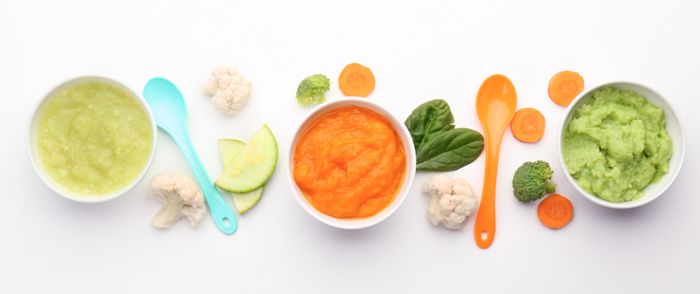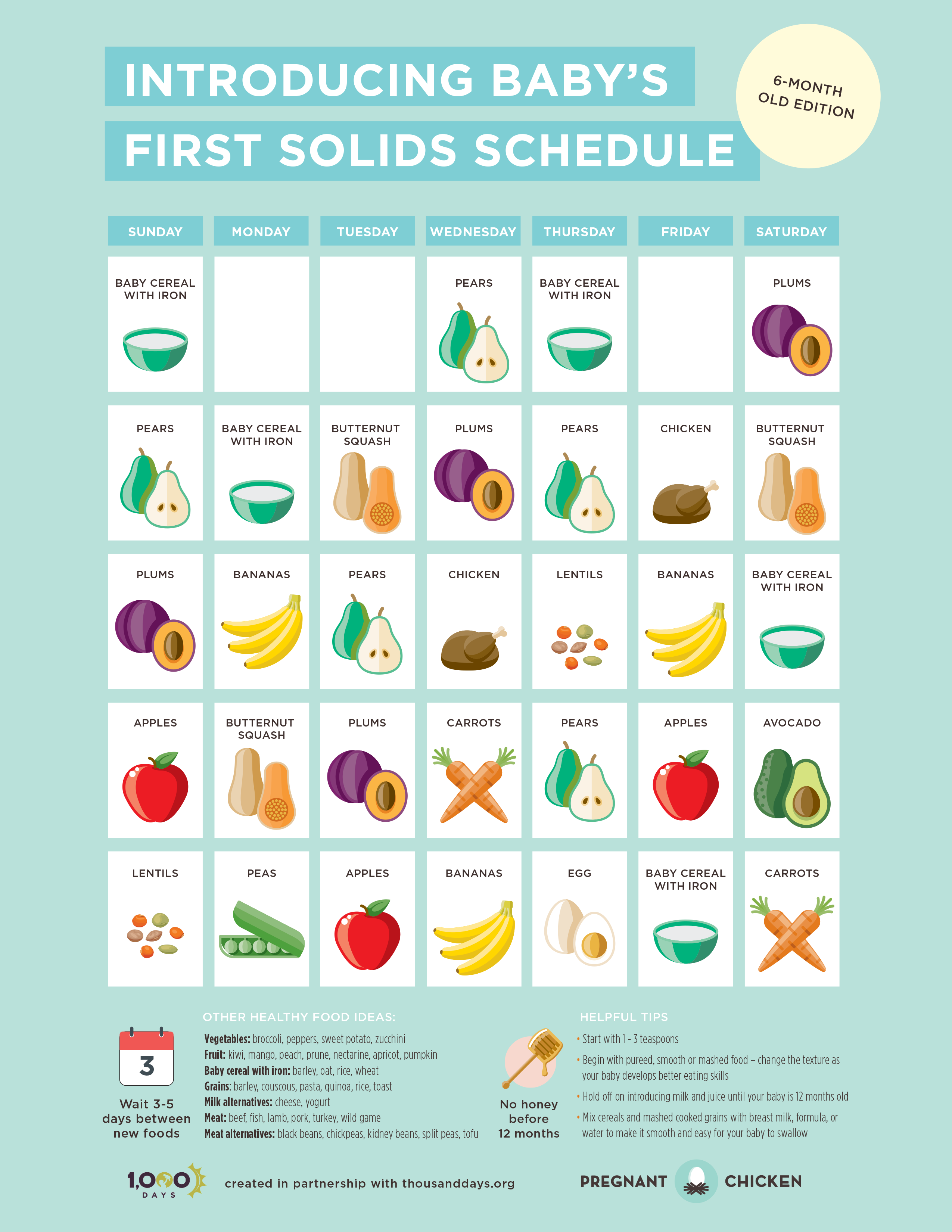Although there are roughly ten million questions parents have about taking care of a newborn, one of the most common ones is when to start feeding a baby solids?
With so much information and many differing opinions on introducing solids, it’s no wonder parents are confused. We’ve got some nuggets of wisdom to share to try to clear things up on when it’s the right time to start your baby on solid foods.
How will I know when my baby is ready to start solid foods?
If you’re trying to figure out whether your baby is developmentally ready for that first spoonful, a good rule of thumb is that they need to have reached the following milestones:
- They can sit up confidently on their own.
- They don’t instantly push solids out of their mouth with their tongue.
- They like to chew.
- They are starting to pick up objects with their thumb and forefinger (also known as a pincer grasp).
- They show interest in mealtime may try to grab food and put it in their mouths.
What is the right age to start my baby on solids?
The American Academy of Pediatrics, the World Health Organization, the American Academy of Family Physicians, the CDC, UNICEF and a ton of other health organizations have made the recommendation to delay solids until 6 months, their reasoning is basically because it doesn’t hurt not to.
According to the AAP, waiting until 6 months to introduce solids won’t delay your baby’s growth, and won’t increase their risk of developing allergies; they will be able to thrive on breast milk or formula alone.
What are the benefits of waiting until 6 months to start feeding my baby solids?
Some of the benefits of hanging back on solids include:
- giving baby’s digestive system time to mature
- increasing protection from illness
- ensuring baby is developmentally ready to eat solids
- potentially protecting them from developing iron-deficiency anemia
What about a 4 month old eating solids?
You will inevitably hear from some mom in a Facebook group or relative at a family gathering that it’s okay to start as early as four months.
The only organization that backs this is the American Academy of Allergy Asthma and Immunology. They recommend introducing your baby to solids between four and six months, starting with less allergenic foods and gradually introducing eggs, dairy, peanuts, tree nuts, fish and shellfish.
They state that delaying introduction to these types of foods actually can increase your baby’s risk of developing allergies.
Most health organizations still recommend waiting until 6 months, but have a chat with your doctor to decide what’s best for your kiddo.
Will my baby sleep better when they start eating solids?
There’s a good chance your great Aunt Joan has told you that the sooner you can get your baby on solids, the sooner you’ll be able to clock in a full night’s sleep. Sorry, Aunt J, but no.
Unfortunately, studies have not only shown that solids won’t help your baby sleep longer, but they can actually have the opposite effect if the food gives your baby a tummy ache (or a diaper explosion).
Your best bet is just to ride it out and tell ol’ Aunt Joan that you’ll “totally look into it” the next time she tells you to add some cereal to your baby’s bottle.

What foods should I introduce to my baby first?
While you can totally let your baby try a little bit of everything, it’s recommended that you offer them one new food every three days to watch for signs of an allergic reaction, including vomiting, rashes, or diarrhea.
Sticking to one food at a time helps you pinpoint what caused the allergy, rather than trying to figure out which of the 5 things on their plate gave them a reaction.
This includes cereal – start with single whole grains like oat or barley instead of ‘oat and apple’ at first so if your baby has a reaction you know which one is the culprit.
Introducing solids schedule for a baby
Here’s a sample schedule of how you can start introducing solid food into your baby’s diet.

Is there anything I absolutely need to feed my baby?
It’s super important that your baby eats foods rich in iron to help with their development. Vitamin D and Zinc are also key players.
- Iron: Adequate levels of iron are crucial to brain development and reduce your baby’s risk of developing anemia. In addition to fortified cereals, foods like tofu, beans, dark green leafy vegetables, eggs, poultry, red meat and fatty fish are great sources of iron. Pairing these foods with foods high in vitamin C (like citrus fruits, berries, tomatoes, broccoli, and cabbage) helps with iron absorption.
- Zinc: Zinc can be found in foods like red meat, whole grain breads and cereals, seafood and dried beans. Your baby needs zinc to help with the growth and development of their immune system, reproductive organs, and their brain.
- Vitamin D: Vitamin D is important for bone development. The most common way to make sure your baby gets enough is with those handy little drops, but fish, eggs, and vitamin D fortified products like cow’s milk (for kids over a year) also contain vitamin D.
Is there anything I absolutely shouldn’t feed my baby?
- Yep. It’s important that your baby doesn’t eat any honey or foods with honey until they’re at least twelve months, as there is a risk of infant botulism.
- You can also skip added sugar, processed foods, juices and whole milk (wait until they are at least 12 months old).
- Be mindful of foods like grapes, raisins, popcorn, raw vegetables and nut butters, as they are choking hazards.
It’s also important to note that it’s normal for your baby to gag to get rid of foods that are too challenging, so stay calm if you see watery eyes, coughing or sputtering. If your baby begins to choke, they won’t be making noise – that’s when you need to step in. Stay up to date on what to do if your baby is choking.
What is baby-led weaning?
Many parents will take the pureed route while their baby learns the ropes of solid foods, while others prefer baby-led weaning.
If you’re not familiar with the term, baby-led weaning allows your little one to take the driver’s seat in trying solid foods. Around 6 months offer soft finger foods that they can pick up and bring to their mouth themselves.
Benefits of baby-led weaning include improving hand-eye coordination, chewing skills, and healthy eating habits (such as stopping when they’re full). It’s recommended that you start with single-ingredient foods to help identify any potential allergens for your kiddo.
What’s the scoop on baby poop when eating solids?
Once your baby starts eating solid foods, their poop will change.
Prepare yourself for stinkier, firmer turds that will either become more or less frequent than they were before, depending on what they’re eating (hey – we never said it would become more predictable!)
If your baby has diarrhea, it could be signs of an allergy, so make a note of the food they ate prior to that diaper change and pay close attention the next time they try it.
Have you started your baby on their solid food journey yet?
Do you have any pearls of wisdom that made things easier you’d like to share? Fill us in in the comments!
About 1,000 Days: Leading the fight to build a strong foundation for mothers, children & their nations to thrive. 1,000 Days seeks grants from foundations to educate parents and caregivers about complementary feeding and first beverages. The Robert Wood Johnson Foundation contributed to a grant that supports these activities in line with their mission to improve the health and healthcare of all Americans. You can find more information on their website or check them out on Instagram.
Our next reco: Beverage Guidelines for Babies and Kids




Leave a Comment